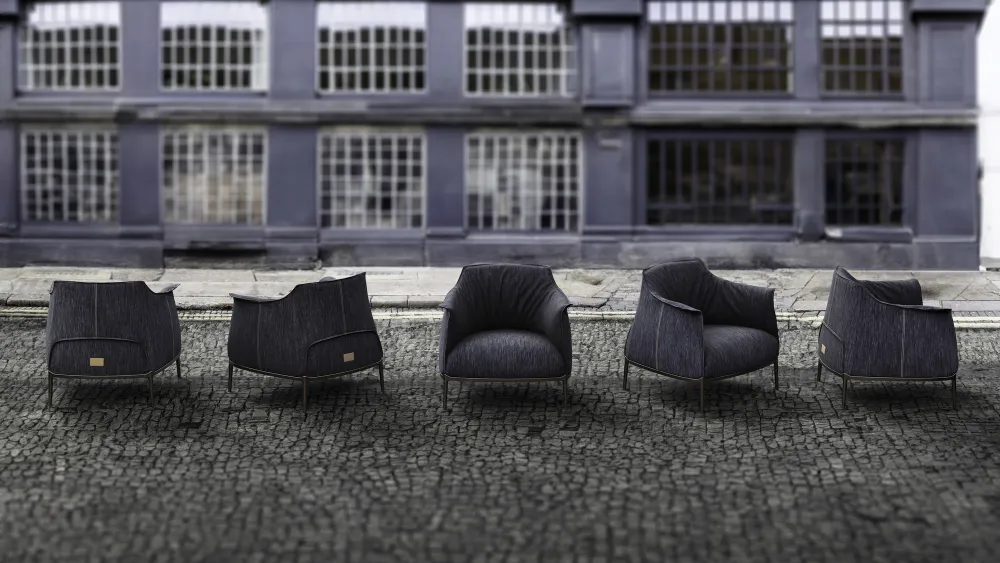
MILAN — The Aura Blockchain Consortium has welcomed the first two furniture firms to its community of luxury brands. On Tuesday, the Switzerland-based group said Italian luxury furniture brands Poltrona Frau and Savio Firmino joined as associate members, as they, like many other luxury players, seek to enhance authenticity, traceability, incorporate certifications and meet requirements laid out by new EU environmental regulations specific to the sector.
In a statement, the consortium said Poltrona Frau and Savio Firmino will add “new depth to the authority and range of Aura’s capabilities” and that each firm will implement tailor-made digital product passport, or DPP, initiatives for their products in the coming months.
Digital product passports connect a physical product to a digital record that can house product information and sourcing through the supply chain for a deep dive on traceability.
By working with Aura to develop immutable, blockchain-based digital identities and certificates of ownership for their products, Poltrona Frau and Savio Firmino are paving the way for product authentication in the home sector, the press release explained.
From automotive to fashion, the consortium now encompasses more than 50 members, from the founding five in 2022 which included LVMH Moët Hennessy Louis Vuitton, Diesel parent company OTB Group, Prada Group, Richemont’s Cartier and Mercedes-Benz.
Earlier this year, the consortium said it registered 50 million products on its private blockchain.
Tolentino-based Poltrona Frau, founded in 1912, will initially provide digital product passports for two of the brand’s most iconic products: the Vanity Fair and the Archibald Collection. The digital product passports will be rolled out to the entire collection thereafter.
Florence-based Savio Firmino also plans to implement digital product passports for signature pieces, starting with iconic children’s Collection “Notte Fatata.” This initiative will provide information about the origin, materials and craftsmanship of each item. Additionally, Savio Firmino is exploring the integration of EU Deforestation Regulation certification into its blockchain tracking, which will be mandatory by 2026. According to the statement, Savio Firmino had already been recording products on a blockchain since 2021 but chose to seamlessly change blockchain provider in 2024 in order to gain access to Aura Blockchain Consortium’s industry-leading luxury blockchain expertise.
“We now plan to strengthen our blockchain capabilities, and Aura Blockchain Consortium’s industry leadership, nuanced expertise and powerful solutions makes this community the perfect partner for us. The process of changing blockchain provider was seamless and we are proud to be collaborate on the future of transparency, quality and customer experience for luxury,” said Savio Firmino chief executive officer Cosimo Savio in the statement.
Brands have quickly adapted to the new blockchain capabilities, which can, among other things, trace product through resale and repair, as well as authenticate and combat counterfeiting.
OTB brands like Jil Sander, Marni and Maison Margiela said they would implement a certificate of authenticity for their garments and accessories with their fall 2024 collections.
The blockchain’s private and closed network strives to cater to the privacy concerns of luxury brands. Its technology will also enable member brands to prepare for upcoming sustainability-focused requirements of the European Union.
This is particularly the case for luxury furniture-makers who are hard pressed to catch up with rising regulatory demands, particularly the Ecodesign for Sustainable Products regulation, which aims to improve the circularity, energy performance and other environmental sustainability aspects of products placed on the EU market, Aura Blockchain Consortium CEO Romain Carrere explained to WWD.
“The Ecodesign for Sustainable Products Regulation, which came into force in July, will make transparency and traceability a regulatory requirement for any luxury brand selling in the European market. Many products in the EU will need digital product passports by 2027, and luxury furniture makers will feel the effects of this regulation across the breadth of their operations — from reporting on raw materials to supply chain processes,” he said.
